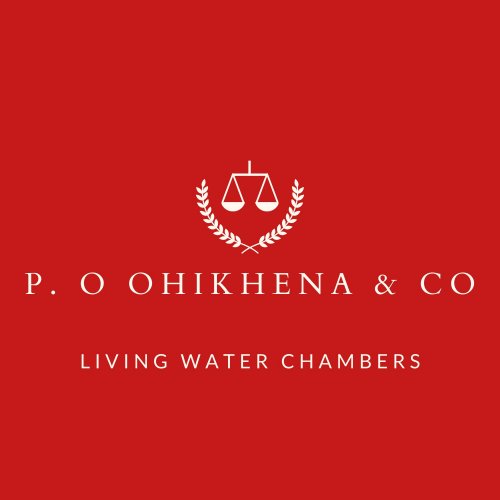Best Housing, Construction & Development Lawyers in Benin City
Share your needs with us, get contacted by law firms.
Free. Takes 2 min.
Free Guide to Hiring a Real Estate Lawyer
List of the best lawyers in Benin City, Nigeria
About Housing, Construction & Development Law in Benin City, Nigeria
Housing, Construction & Development law in Benin City, Nigeria, governs the processes involved in the real estate sector, including residential and commercial construction, land use, zoning, housing development, and property rights. These laws are critical to ensuring that development efforts align with city planning and regulations, while also protecting the rights of landowners, developers, and residents. The legal framework in this field is primarily derived from national laws, such as the Land Use Act, as well as local regulations set by the Edo State government and the Benin City municipal authorities.
Why You May Need a Lawyer
There are numerous situations where one may require legal assistance in Housing, Construction & Development in Benin City. These include:
- Disputes over land ownership or property boundaries
- Challenges related to land acquisition for development projects
- Negotiating and drafting contracts for construction projects
- Ensuring compliance with zoning laws and other regulatory requirements
- Resolving issues with construction defects or delays
- Managing tenancy agreements and disputes
- Navigating housing finance and mortgage issues
- Seeking recourse for eviction or wrongful demolition
- Filing or defending a lawsuit related to construction or property developments
- Understanding environmental obligations in construction projects
Local Laws Overview
Key aspects of local laws relevant to Housing, Construction & Development in Benin City include:
- Land Use Act: Governs land ownership and administration in Nigeria, granting state governors control over land within their states.
- Urban and Regional Planning Law: Regulates city planning, land use zoning, and development control to ensure orderly development.
- Building Codes and Regulations: Set standards for construction safety and quality, including materials, design, and structural integrity.
- Tenancy Laws: Address the rights and responsibilities of landlords and tenants, rent control measures, and eviction procedures.
- Environmental Regulations: Ensure that construction projects meet environmental standards to protect the ecosystem and community health.
- Local Government By-laws: May impose additional restrictions or conditions on construction activities within specific areas of Benin City.
Frequently Asked Questions
What is the first step in acquiring land for development in Benin City?
The process usually starts with conducting a property search at the Land Registry to verify the ownership, status, and history of the parcel of land you intend to acquire.
What are building permits, and why do I need them?
Building permits are official approvals required before constructing or modifying structures. They ensure compliance with local building codes and zoning laws aimed at public safety.
What rights do tenants have under local law?
Tenants are entitled to quiet enjoyment of their rented property and protection from illegal eviction. They also have rights regarding rental increases and to have necessary repairs done by landlords.
Can a lawyer help me with zoning issues?
Yes, a lawyer can assist you in understanding zoning laws, applying for rezoning, or representing you in disputes with local authorities or neighbors about land use.
How can construction disputes be resolved?
Disputes may be resolved through negotiation, mediation, arbitration, or court litigation, depending on the complexity and nature of the issue.
What steps should I take if my construction project delays?
Review your contract for clauses regarding delays, communicate with the contractor for assessments, and consider legal action if needed to recover costs or enforce contractual terms.
Who regulates the quality of construction work?
The quality of construction work is regulated by local building codes enforced by the relevant authorities which may include site inspections during construction.
Are there laws protecting against environmental harm from construction?
Yes, environmental laws require that construction projects assess and mitigate their impact on the environment, sometimes necessitating Environmental Impact Assessments (EIAs).
What can I do if I face wrongful eviction?
If you face wrongful eviction, you should seek immediate legal advice to explore your options for legal recourse and possibly obtain an injunction to restore possession.
Is there any law concerning defective building structures?
Yes, the law holds builders liable for construction defects. Legal remedies may be pursued if defects arise out of negligence or breach of contract.
Additional Resources
For further assistance, consider exploring the following resources:
- Edo State Ministry of Physical Planning and Urban Development
- Benin City Municipal Authorities
- The Nigerian Institution of Estate Surveyors and Valuers
- Nigerian Bar Association - Benin City Branch
- Online portals like the Nigerian Legal Information Institute
Next Steps
If you need legal assistance, the next steps include:
- Consulting with a local lawyer specializing in Housing, Construction & Development law to discuss your situation and obtain tailored advice.
- Gathering relevant documentation concerning your case, such as contracts, permits, and correspondence.
- Researching and selecting a qualified attorney or law firm with experience in relevant cases.
- Considering alternative dispute resolution methods if applicable, such as mediation or arbitration.
By taking these steps, you can better navigate the legal complexities of Housing, Construction & Development in Benin City and protect your interests.
Lawzana helps you find the best lawyers and law firms in Benin City through a curated and pre-screened list of qualified legal professionals. Our platform offers rankings and detailed profiles of attorneys and law firms, allowing you to compare based on practice areas, including Housing, Construction & Development, experience, and client feedback.
Each profile includes a description of the firm's areas of practice, client reviews, team members and partners, year of establishment, spoken languages, office locations, contact information, social media presence, and any published articles or resources. Most firms on our platform speak English and are experienced in both local and international legal matters.
Get a quote from top-rated law firms in Benin City, Nigeria — quickly, securely, and without unnecessary hassle.
Disclaimer:
The information provided on this page is for general informational purposes only and does not constitute legal advice. While we strive to ensure the accuracy and relevance of the content, legal information may change over time, and interpretations of the law can vary. You should always consult with a qualified legal professional for advice specific to your situation.
We disclaim all liability for actions taken or not taken based on the content of this page. If you believe any information is incorrect or outdated, please contact us, and we will review and update it where appropriate.










